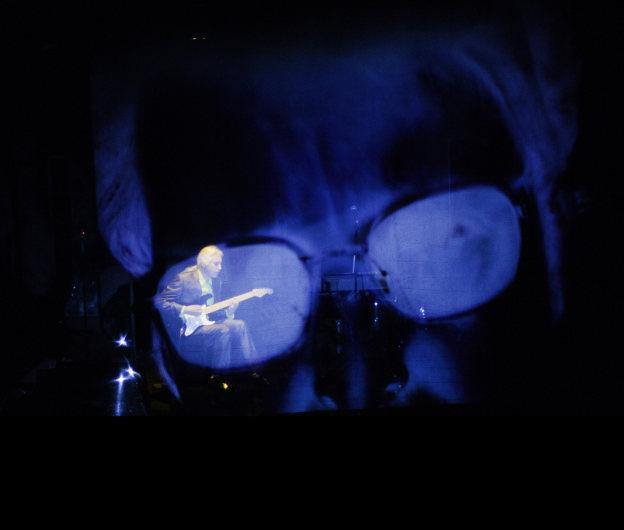
In Shiny Floor Shiny Ceiling Andrew Poppy has created a piece of abstract experimental music theatre described in the programme as: ‘An opera entertainment, 9 songs in search of a territory, 7 voices in search of a song.’ It is more of a concert than a theatrical performance: Poppy provides vocals for much of it, donning dark sunglasses in a spot on centre stage. Other songs are sung by guests, introduced by Poppy, or by video projection which is cast onto a gauze at the front of the stage. The minimalist music he creates walks in the footsteps of composers such as John Cage and takes its place proudly at the far edge of what is popular, challenging listeners’ conceptions of what music should be and how it is put together.
It begins with an abstract collage that consists of snippets of spoken words set to sparse music; the jagged rhythms and dissonance have a feeling of jazz or beat poetry. It feels very inaccessible to an audience member with little to no experience of minimalist composition and the whole thing has an air of pretension, certainly not helped by the dark sunglasses that Poppy chooses to wear when he speaks into the microphone.
The individual songs that follow do not help the atmosphere of pretence that is fostered from the beginning. The titles given to each song are nearly incomprehensible and do little to help our understanding of the themes being presented. The more memorably cryptic among them were ‘The seamstress of the corridor’ and ‘Henry fortune, the lucky horse’.
Consequently I very quickly lost any ability to apply meaning to the performance and found myself distanced. Adding further to my dissatisfaction was the music itself, which was unfortunately not to my taste at all. Each song followed the same formula of sparse instrumentation, weird dissonant synthesised sounds, a reluctance to keep to a regular rhythm, and a frustrating tendency to repeat the title of the song over and over; it was all reminiscent of the worst that the 80s had to offer. I might have been able to enjoy watching the music being created live but only a few piano parts were played by Poppy on stage; the rest was recorded – including one aggravating moment when a singer called ‘The Ghost of Rilke’ mimed along to a recording. With no degree of skill. In fact the miming was so bad I became convinced it must have been a specific choice by the director. But the programme had no director credited, and this I feel is at the root of the problem. The abstract ideas are perhaps credible as individual pieces but they do not come together at all well in a theatrical context.
The projections which at first seemed so promising soon suffer from repetition, each one using the same ‘photo negative’ effect, and they lose all their potential to provide any interesting moments. I had hoped that the performers on stage would interact with them somehow, or that they would be used to deepen our understanding of the meaning of the songs. But each one played out the same and they soon became frustrating to watch.
However much it jarred with me personally it is undeniable that there is much skill on display here. The piece is very professionally produced: the lighting, designed by Marty Langthorne, is very good, and all the performers are notably skilful in their execution – particularly Margaret Cameron who delivered an excellent vocal performance as Persephone.
But by the end I’d little patience left. Experimental theatre is important; it can help to push the boundaries of what a theatrical experience can be. But it should still leave an opening for the audience to place their understanding. Without the possibility to derive any meaning, however subjective, the experience is incomplete and any lasting impact on the audience is irredeemably diminished.

